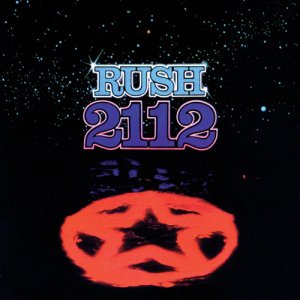Released in 1976, 2112 marked a pivotal moment in Rush’s career, transforming the band from struggling musicians into progressive rock pioneers. After the commercial disappointment of Caress of Steel, the pressure was on the Canadian trio to deliver a more accessible, radio-friendly album. Instead, Rush doubled down on their artistic vision, creating a sprawling, sci-fi concept album that defied industry expectations.
The album’s title track, a 20-minute, seven-part suite, told the story of a dystopian future where individual expression is outlawed. This bold creative gamble paid off. 2112 was a commercial breakthrough, resonating with fans who appreciated the band’s commitment to complex musicianship and thematic depth. The album not only secured Rush’s future but also set the stage for their rise as one of rock’s most innovative acts. Despite mixed initial reviews, 2112 quickly became a fan favorite and remains a cornerstone in the band’s legendary catalog.
Background: Rush’s Struggles Leading Up to 2112
By 1975, Rush found themselves at a crossroads. Their third album, Caress of Steel, had been an ambitious effort, blending hard rock with lengthy, progressive tracks. However, it failed to gain commercial traction, leaving both fans and critics confused by its sprawling nature. Sales were disappointing, and the band’s record label, Mercury, grew concerned. The label pressured Rush to abandon their experimental direction in favor of more conventional, radio-friendly material.
This presented a dilemma: conform to the label’s demands and risk losing their creative identity, or continue pushing the boundaries of their sound at the risk of alienating both the label and their audience.
Rush chose the latter path. Rather than play it safe, they doubled down on their progressive tendencies, crafting 2112—a bold concept album that would either solidify their career or mark the end of the road. The stakes couldn’t have been higher. The band’s refusal to compromise set the stage for 2112 as a make-or-break album, one that would either define their artistic integrity or result in their potential downfall.
Concept and Storyline of 2112

The central narrative of 2112 is set in a dystopian future where creativity and individuality are suppressed by a totalitarian regime known as the Priests of the Temples of Syrinx. In this society, all aspects of life are tightly controlled, and any form of personal expression—especially music—is forbidden. The story follows a protagonist who discovers an ancient guitar and, through it, the power of music. When he presents this newfound creativity to the ruling Priests, they reject and destroy the instrument, leading to the protagonist’s despair and ultimate downfall.
The concept of 2112 was heavily influenced by Ayn Rand’s novella Anthem, which shares similar themes of individualism versus collectivism. Neil Peart, Rush’s drummer and primary lyricist, drew inspiration from Rand’s exploration of a future where the concept of the individual has been erased in favor of a collective society. In both 2112 and Anthem, the central figure’s discovery of a forgotten form of expression symbolizes the power of creativity and personal freedom.
While the album does not adhere strictly to Rand’s philosophical ideas, Peart used the dystopian setting to craft a cautionary tale about the dangers of conformity and the suppression of art. Through this ambitious narrative, 2112 became not just a musical statement but a thematic one, aligning the band’s music with a broader message of defiance against creative restriction.
Songwriting and Musical Approach
The songwriting process for 2112 was a true collaboration between Rush’s core trio: Geddy Lee (bass/vocals), Alex Lifeson (guitar), and Neil Peart (drums/lyrics). Building on the musical chemistry they had developed over their earlier albums, the band seamlessly fused Peart’s dystopian lyrics with their complex, progressive rock sound, creating an immersive sonic experience that matched the album’s ambitious storyline.
Peart’s lyrics served as the narrative backbone, blending philosophical ideas with vivid imagery of rebellion and suppression. Geddy Lee and Alex Lifeson brought these themes to life musically, composing a sweeping, 20-minute title track that featured extended instrumental passages, dynamic tempo changes, and technical virtuosity. The multi-part “2112” suite explored a wide emotional range, from the ominous, tightly controlled “Overture” and “The Temples of Syrinx” to the protagonist’s discovery of music in “Discovery” and the soaring guitar solos that echoed the theme of freedom.
Rush’s use of extended compositions allowed them to fully explore the narrative, shifting from aggressive, high-energy sections to softer, more introspective moments that mirrored the protagonist’s journey. Lee’s soaring vocals and Lifeson’s intricate guitar work complemented Peart’s drumming, which provided a powerful rhythmic foundation throughout the suite. The band’s musical dexterity and tight interplay reflected the emotional weight of the story, and each member’s instrumental prowess was on full display.
Recording Process
2112 was recorded at Toronto Sound Studios in late 1975, with long-time collaborator Terry Brown at the helm as producer. Known for his meticulous approach, Brown had already worked with Rush on their earlier albums, but 2112 marked a turning point in their partnership. His ability to balance the band’s raw power with their growing sophistication was instrumental in shaping the album’s bold, expansive sound.
The recording process itself was intense, as the band was under considerable pressure to deliver a successful album after the commercial disappointment of Caress of Steel. Despite the high stakes, Rush remained committed to their creative vision. They faced the challenge of translating the ambitious, multi-part 2112 suite into a cohesive recording, with extended compositions and intricate changes in tempo and dynamics. This required a heightened level of precision and coordination in the studio, as each member pushed their technical abilities to new limits.
One notable moment during the sessions was the recording of the guitar-driven section “Discovery,” where Alex Lifeson captured the protagonist’s awe at discovering music for the first time. Lifeson’s playing had to feel both spontaneous and emotive, reflecting the character’s sense of wonder, and this section became one of the album’s defining moments.
Terry Brown’s production played a crucial role in bringing out the best in the band. His experience helped refine their sound without diluting their complexity. Brown gave space for Neil Peart’s thunderous drumming, Geddy Lee’s dynamic bass lines and high-pitched vocals, and Alex Lifeson’s guitar work to shine, ensuring that each part contributed to the larger narrative. His careful attention to detail ensured that the album’s ambitious scope didn’t overwhelm the listener but instead created an engaging and immersive experience.
Reaction and Legacy
Upon its release in 1976, 2112 received a mixed reaction from critics but was embraced wholeheartedly by Rush’s growing fanbase. While some critics struggled with the album’s unconventional structure and ambitious concept, fans were drawn to its defiance of musical norms and its sweeping, sci-fi narrative. The title track, with its epic 20-minute length, resonated deeply with listeners who appreciated the band’s refusal to conform to industry expectations. Almost overnight, 2112 became a rallying point for progressive rock fans who admired the band’s boldness and technical prowess.
For Rush, 2112 was a lifeline. After the commercial failure of Caress of Steel, their record label had pushed for a more radio-friendly sound, but the band’s decision to pursue their creative vision with 2112 paid off. The album’s success—eventually reaching gold status in the U.S. and Canada—rescued Rush from the brink of disbandment and firmly established them as leaders in the progressive rock genre. 2112 not only saved their career but also cemented their reputation as artists willing to take risks, a trait that would define the rest of their career.
In the long term, 2112 has become a touchstone for concept albums and sci-fi themes in rock music. Its exploration of dystopian futures and individual freedom influenced generations of musicians, particularly in the progressive and metal scenes. Bands like Dream Theater, Coheed and Cambria, and even Tool have cited Rush—and 2112 in particular—as an influence on their own conceptual and experimental work.
Conclusion
2112 was a defining moment in Rush’s career, transforming the band from a struggling rock trio into progressive rock icons. The album’s ambitious narrative, bold musical compositions, and refusal to conform to industry pressure proved that artistic integrity could triumph over commercial constraints. In doing so, 2112 not only saved Rush from disbandment but also established them as pioneers of complex, conceptual music in the rock world.
Decades after its release, 2112 remains a cornerstone of progressive rock, continuing to inspire musicians and fans alike. Its themes of individuality, creative freedom, and defiance against conformity resonate just as strongly today, while its influence can be heard in countless concept albums across genres. Rush’s daring vision on 2112 forever changed the landscape of rock music, and its legacy endures as a testament to the power of innovation in art.
